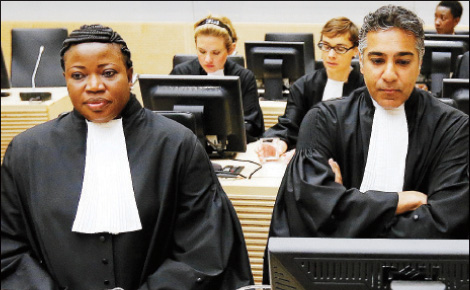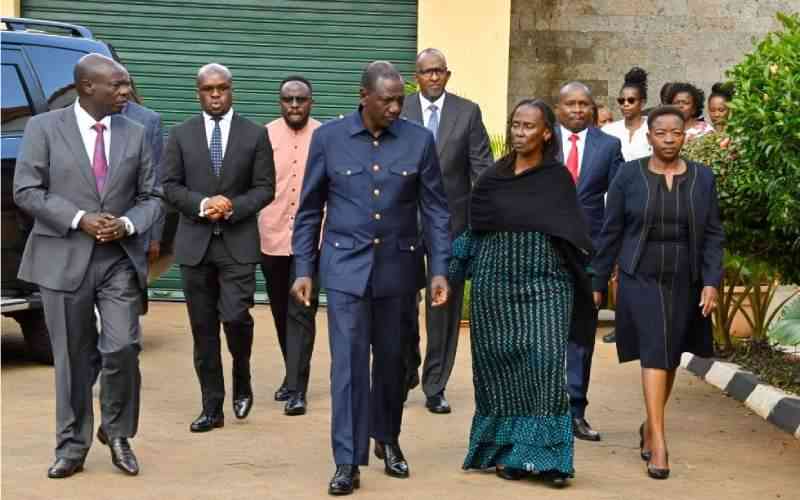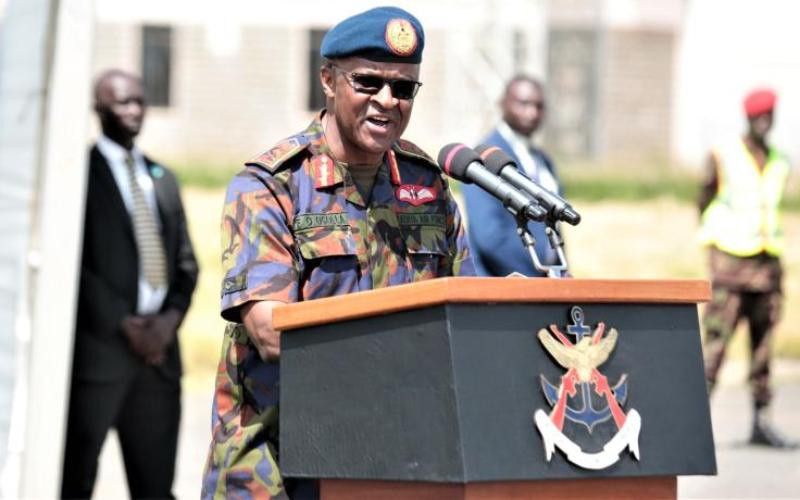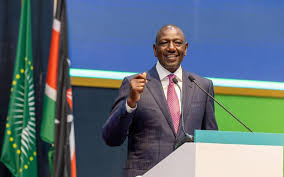 |
|
ICC Prosecutor Fatou Bensouda (left) follows proceedings at the ICC during a case against Kenyans accused of playing roles in the 2007/2008 post-election violence. [PHOTO: FILE/STANDARD] |
By ALLY JAMAH
NAIROBI, KENYA: ICC Prosecutor Fatou Bensouda is fighting to have five key witnesses against Deputy President William Ruto testify in secret as The Hague trial resumes on Monday. The witnesses are central to the prosecution’s case against Ruto because their testimony is classified as “insider-type information”, including claims they attended meetings to plan attacks at which Ruto was allegedly present. The importance of their testimonies, specifically that of witness P-0028, is highlighted by the fact that Ruto will be required to be present in The Hague courtroom when the witness testifies.
Bensouda has described this particular witness as a Kalenjin who possesses “insider-type information” about planning meetings and the role Ruto and his key associates allegedly played in the 2007/2008 post-election violence.
They are among eight witnesses that the defence in the case against Ruto and his co-accused, radio presenter Joshua Sang, claims gave false testimonies around which the cases are based on.
Bensouda has applied for in-court protective measures for three witnesses known by their pseudonyms – P-0508, P-0028 and P0019 – and renewed similar requests for witnesses P-0452 and P-0469.
For witnesses P-0508, P-0028, P0019 and P-0469, the chief prosecutor is requesting for image and voice distortion, arguing the protective measures do not unduly prejudice the accused as the witnesses will remain anonymous to the public only.
But the prosecution wants witness P-0452 to be heard “entirely in camera”.
The crucial witnesses will attempt to link Ruto to the violence that saw at least 1,300 people lose their lives and over half a million displaced.
Witness P-0028, Bensouda says, testified that he was present at planning meetings and went on to outline the alleged roles Ruto and his key associates played in the post-poll skirmishes.
The information includes the alleged meetings Ruto hosted and attended, and where preparations for the attacks against their political opponents were discussed and implemented.
COMMON PLAN
According to Bensouda, the same witness has testimony against Ruto’s co-accused Sang’s contribution to the so-called “common plan” for the violence against their perceived political opponents after the disputed 2007 elections.
His testimony is expected to hold the Deputy President at The Hague for an entire month.
Also lined up is witness P-0019, also described as a Kalenjin who allegedly possesses insider-type information about the meetings that planned and organised the violence.
He allegedly knows the meetings that the Deputy President either attended or was directly referred to and where the attacks were allegedly planned and rewarded.
Stay informed. Subscribe to our newsletter
In July last year, Ruto’s lawyers claimed that the two witnesses are among a core group of eight who are “liars” and had allegedly “cooked evidence” against the Deputy President.
Ruto’s lawyer Karim Khan said that the heart of the case was built on the testimony of these eight witnesses, warning that he was waiting to “expose” them at the earliest opportunity during the trial and tear into shreds the case against his client.
DELIBERATE SCHEME
“Based on witness statements and documents, the defence has substantial grounds to believe that these eight key prosecution witnesses have been part of a deliberate and concerted scheme to “cook” evidence against Mr Ruto. It is in the interest of justice that this criminal scam be unmasked,” Khan then said.
“The defence will endeavour to show that the actions and conduct of these witnesses constitute an orchestrated attempt to deceive the ICC judges and obstruct the proper administration of justice,” argued Khan.
This stage of the trial appears crucial for Bensouda, given that on Monday she asked the judges to allow for their testimonies to be heard in camera to protect the safety of the witnesses and their families.
On Monday, Bensouda requested the judges to have the testimony of another key witness, P-0452, against Ruto carried out completely in camera.
The prosecution said even face, voice distortions and identity concealment were not enough for this witness due to what Bensouda termed as “special circumstances”.
But she has not indicated the nature of the witness’ testimony.
Bensouda may get into trouble with this witness if the judges refuse her request for a full in camera hearing since the witness has insisted on this in order to testify, leaving Bensouda in the lurch.
If blanket secrecy is not allowed for the others, Bensouda says she is content to have them protected through the routine courtroom techniques of voice and face distortion and use of pseudonyms.
In her Monday submission to the judges, Bensouda said that witness P-0028 has been the subject of direct and indirect intimidation in Kenya in connection with his alleged knowledge of the post-election chaos.
“Revealing the witness to the public will compromise his safety and that of his family. Moreover, the concern for the possible consequences constitutes an additional emotional strain on the witness,” said the prosecutor.
As regards witness P-0019, the prosecution has previously informed Pre-Trial Chamber judges about incidents demonstrating that this witness has been the target of direct and indirect intimidation in Kenya.
BOWS AND ARROWS
Another witness lined up is P-0508 who allegedly saw Kalenjins burning Kikuyus’ homes from December 30 to 31, 2007, and P-0508 also claims to have witnessed Kalenjins shooting Kikuyus with bows and arrows on December 31, 2007 and is described as both a witness and victim.
Bensouda has concealed key details about this witness, but indicated that P-0508 lives in an area where the majority of people are hostile to ICC witnesses.
Although references to witness P-0508 are heavily redacted, there are references that “he is well known.”
Bensouda says witness P-0452 was among the 10 witnesses whom the prosecution intended to call to testify during the first session of the present case.
P-0469 was originally scheduled to testify during a previous session of the proceedings.
The identity of P-0508 was disclosed to the accused in January last year.
Ruto’s lawyers are expected to file submissions indicating whether they have a problem with Bensouda’s request for the witnesses testify in private and have their identities concealed.
Once the trial session resumes Monday, it will run until April 16 before the court takes the Easter break.
Ruto will be required to be physically present in court during the four-week testimony of P-0028.
 The Standard Group Plc is a
multi-media organization with investments in media platforms spanning newspaper
print operations, television, radio broadcasting, digital and online services. The
Standard Group is recognized as a leading multi-media house in Kenya with a key
influence in matters of national and international interest.
The Standard Group Plc is a
multi-media organization with investments in media platforms spanning newspaper
print operations, television, radio broadcasting, digital and online services. The
Standard Group is recognized as a leading multi-media house in Kenya with a key
influence in matters of national and international interest.
 The Standard Group Plc is a
multi-media organization with investments in media platforms spanning newspaper
print operations, television, radio broadcasting, digital and online services. The
Standard Group is recognized as a leading multi-media house in Kenya with a key
influence in matters of national and international interest.
The Standard Group Plc is a
multi-media organization with investments in media platforms spanning newspaper
print operations, television, radio broadcasting, digital and online services. The
Standard Group is recognized as a leading multi-media house in Kenya with a key
influence in matters of national and international interest.










